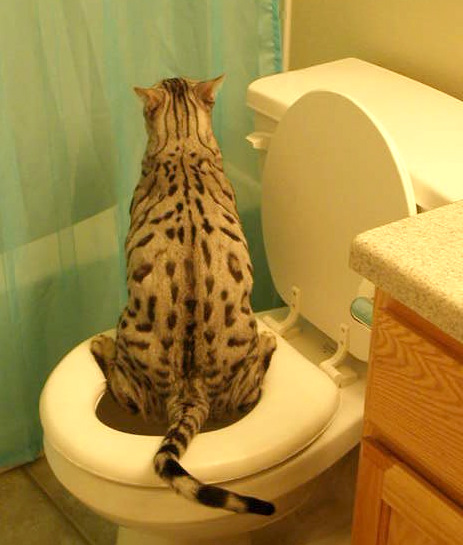Prevent Clogs and Damage: Don't Flush Cat Poop Down Your Toilet - Professional Recommendations
Prevent Clogs and Damage: Don't Flush Cat Poop Down Your Toilet - Professional Recommendations
Blog Article
The content in the next paragraphs pertaining to Don’t flush cat feces down the toilet is especially remarkable. You should give it a look.

Introduction
As pet cat proprietors, it's necessary to bear in mind how we deal with our feline friends' waste. While it may seem hassle-free to flush cat poop down the toilet, this method can have detrimental repercussions for both the setting and human health and wellness.
Ecological Impact
Flushing feline poop presents unsafe microorganisms and bloodsuckers right into the water supply, positioning a considerable danger to water environments. These pollutants can negatively affect aquatic life and compromise water quality.
Health and wellness Risks
Along with environmental concerns, flushing feline waste can also present health risks to people. Pet cat feces may have Toxoplasma gondii, a bloodsucker that can cause toxoplasmosis-- a possibly serious ailment, especially for expecting females and individuals with weakened immune systems.
Alternatives to Flushing
The good news is, there are safer and more liable ways to throw away pet cat poop. Think about the adhering to choices:
1. Scoop and Dispose in Trash
The most typical method of dealing with pet cat poop is to scoop it into a naturally degradable bag and toss it in the trash. Make sure to utilize a dedicated litter scoop and dispose of the waste quickly.
2. Usage Biodegradable Litter
Opt for biodegradable cat clutter made from products such as corn or wheat. These litters are eco-friendly and can be securely dealt with in the garbage.
3. Bury in the Yard
If you have a lawn, consider hiding feline waste in an assigned location far from veggie yards and water sources. Be sure to dig deep enough to avoid contamination of groundwater.
4. Mount a Pet Waste Disposal System
Purchase a family pet garbage disposal system particularly developed for pet cat waste. These systems utilize enzymes to break down the waste, lowering odor and ecological influence.
Final thought
Liable family pet possession prolongs beyond giving food and sanctuary-- it also entails appropriate waste management. By refraining from flushing feline poop down the bathroom and choosing alternative disposal approaches, we can reduce our ecological impact and secure human health.
Why Can’t I Flush Cat Poop?
It Spreads a Parasite
Cats are frequently infected with a parasite called toxoplasma gondii. The parasite causes an infection called toxoplasmosis. It is usually harmless to cats. The parasite only uses cat poop as a host for its eggs. Otherwise, the cat’s immune system usually keeps the infection at low enough levels to maintain its own health. But it does not stop the develop of eggs. These eggs are tiny and surprisingly tough. They may survive for a year before they begin to grow. But that’s the problem.
Our wastewater system is not designed to deal with toxoplasmosis eggs. Instead, most eggs will flush from your toilet into sewers and wastewater management plants. After the sewage is treated for many other harmful things in it, it is typically released into local rivers, lakes, or oceans. Here, the toxoplasmosis eggs can find new hosts, including starfish, crabs, otters, and many other wildlife. For many, this is a significant risk to their health. Toxoplasmosis can also end up infecting water sources that are important for agriculture, which means our deer, pigs, and sheep can get infected too.
Is There Risk to Humans?
There can be a risk to human life from flushing cat poop down the toilet. If you do so, the parasites from your cat’s poop can end up in shellfish, game animals, or livestock. If this meat is then served raw or undercooked, the people who eat it can get sick.
In fact, according to the CDC, 40 million people in the United States are infected with toxoplasma gondii. They get it from exposure to infected seafood, or from some kind of cat poop contamination, like drinking from a stream that is contaminated or touching anything that has come into contact with cat poop. That includes just cleaning a cat litter box.
Most people who get infected with these parasites will not develop any symptoms. However, for pregnant women or for those with compromised immune systems, the parasite can cause severe health problems.
How to Handle Cat Poop
The best way to handle cat poop is actually to clean the box more often. The eggs that the parasite sheds will not become active until one to five days after the cat poops. That means that if you clean daily, you’re much less likely to come into direct contact with infectious eggs.
That said, always dispose of cat poop in the garbage and not down the toilet. Wash your hands before and after you clean the litter box, and bring the bag of poop right outside to your garbage bins.
https://trenchlesssolutionsusa.com/why-cant-i-flush-cat-poop/

I'm just very fascinated with Can You Flush Cat Poop Down The Toilet? and I'm hoping you liked the entire blog entry. Kindly take the opportunity to promote this blog post if you liked it. Thanks so much for going through it.
Further Details Report this page